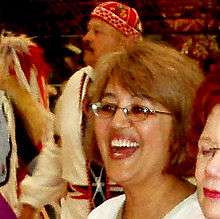Loriene Roy

Loriene Roy is an American librarian from Texas. She was the 2007–2008 President of the American Library Association (ALA).
Biography
Background and education
Loriene Roy was born and raised in rural towns bordering the Fond du Lac Reservation in northern Minnesota. She is Anishinabe, a member of the Minnesota Chippewa Tribe, and is enrolled on the White Earth Reservation.[1] Roy received a Master’s degree in Library Science from the University of Arizona and received her Doctorate degree from the University of Illinois at Urbana-Champaign.[2]
Career
Roy joined the faculty at the University of Texas at Austin in 1987, where she teaches in the School of Information and the Center for Women’s and Gender Studies.[2]
Roy focuses her work on developing and promoting library services and cultural heritage initiatives with and for indigenous populations, public libraries, and measurement and evaluation of library services.[3] She founded and directs a national reading club for Native children called “If I Can Read, I Can Do Anything,” and a scholarship program for indigenous students called “Honoring Generations” that is funded by the Institute of Museum and Library Services.[3]
Roy says that “there are barriers to library use. One is creating the family tradition of supporting libraries and reading. Another is that libraries need to adapt flexible policies-including open hours, circulation length of loan. Tribal libraries can be exciting plans that support cultural expression and should be the place where Native language learning takes place, where records are housed and organized, where children and family members gather.”[1]
American Library Association
Roy began as President-Elect of the American Library Association (ALA) on June 28, 2006, and was inaugurated as the 2007–2008 President of ALA at the 2007 ALA Annual Conference,[3] becoming the first Native American President of the ALA.[4][5]
Roy outlined three main platform issues when she became President: supporting literacy, promoting LIS education through practice, and creating programs for workplace wellness. To help fulfill these goals, she formed working circles in place of traditional task forces, bringing a greater element of inclusivity and community to the work of the presidency.[1] From the presidency Roy says she learned "to face your fears or deficiencies...that many people have ideas for you but only a few are willing to step up and really help. Keep those people happy!"[1]
Previously, Roy was elected ALA Councilor-At-Large for two terms, 1997–2000 and 2004–2006, and served on a number of ALA Council Committees including the Committee on Education, Committee on Committees, Committee on the Status of Women in Librarianship, and Nominating Committee. Roy was also the 1997-1998 President of the American Indian Library Association, and she is a member of the Corazon de Tejas chapter of REFORMA and Associate Member of Te Ropu Whakahau, Maori in Libraries and Information Management.[3]
Awards
Roy has received many professional awards, including the 2006 ALA Equality Award; 2007 Library Journal "Mover & Shaker"; Outstanding 2002 Alumna from the University of Arizona’s School of Information Resources and Library Services; the Joe and Bettie Branson Ward Excellence Award for Research, Teaching, or Demonstration Activities that Contribute to Changes of Positive Value to Society; two Texas Exes Teaching Awards; and two James W. Vick Texas Excellence Awards for Academic Advisors.[2]
References
- 1 2 3 4 LibGig, Amelia Abreu, interviewer. 19 March 2010.
- 1 2 3 "Loriene Roy," Library of Congress. 19 March 2010.
- 1 2 3 4 Loriene Roy web page, University of Texas. 19 March 2010.
- ↑ "ALA – Loriene Roy elected ALA president for 2007-2008". ala.org. 5 June 2006.
- ↑ "The American Indian Experience – A full-text digital resource – EBSCO". ebscohost.com.